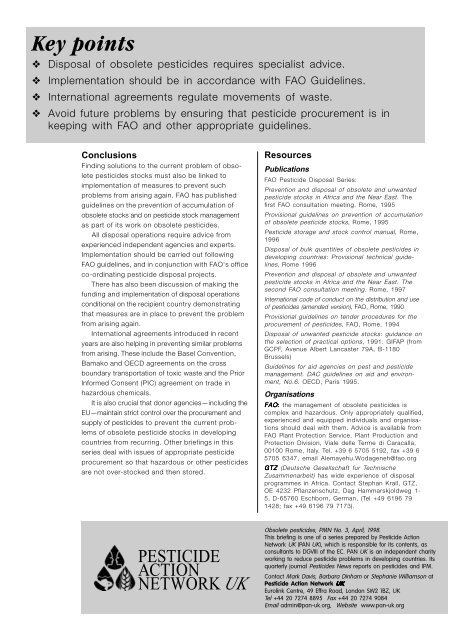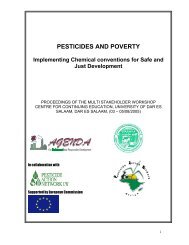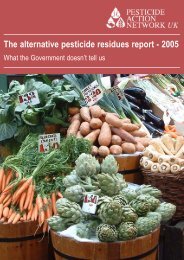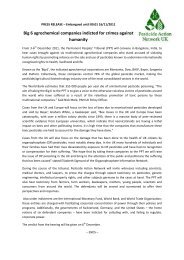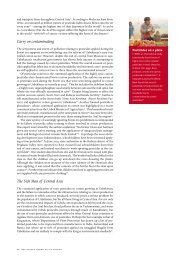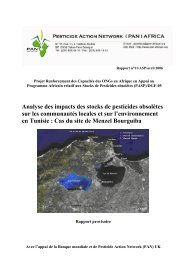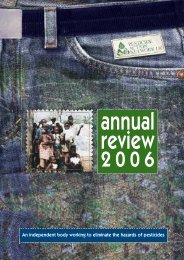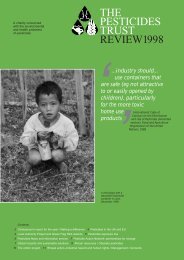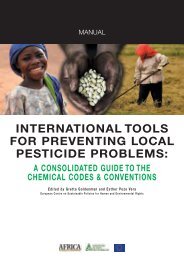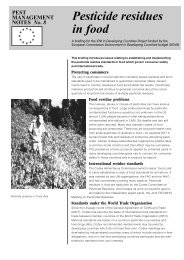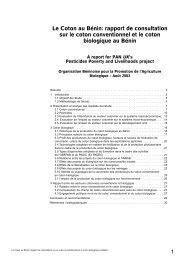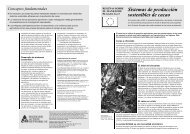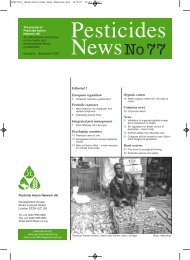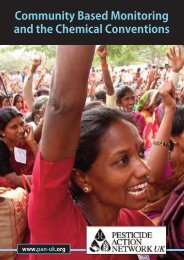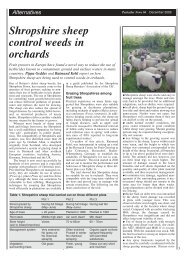Disposal of obsolete pesticides - Pesticide Action Network UK
Disposal of obsolete pesticides - Pesticide Action Network UK
Disposal of obsolete pesticides - Pesticide Action Network UK
You also want an ePaper? Increase the reach of your titles
YUMPU automatically turns print PDFs into web optimized ePapers that Google loves.
Key points<br />
❖ <strong>Disposal</strong> <strong>of</strong> <strong>obsolete</strong> <strong>pesticides</strong> requires specialist advice.<br />
❖ Implementation should be in accordance with FAO Guidelines.<br />
❖ International agreements regulate movements <strong>of</strong> waste.<br />
❖ Avoid future problems by ensuring that pesticide procurement is in<br />
keeping with FAO and other appropriate guidelines.<br />
Conclusions<br />
Finding solutions to the current problem <strong>of</strong> <strong>obsolete</strong><br />
<strong>pesticides</strong> stocks must also be linked to<br />
implementation <strong>of</strong> measures to prevent such<br />
problems from arising again. FAO has published<br />
guidelines on the prevention <strong>of</strong> accumulation <strong>of</strong><br />
<strong>obsolete</strong> stocks and on pesticide stock management<br />
as part <strong>of</strong> its work on <strong>obsolete</strong> <strong>pesticides</strong>.<br />
All disposal operations require advice from<br />
experienced independent agencies and experts.<br />
Implementation should be carried out following<br />
FAO guidelines, and in conjunction with FAO's <strong>of</strong>fice<br />
co-ordinating pesticide disposal projects.<br />
There has also been discussion <strong>of</strong> making the<br />
funding and implementation <strong>of</strong> disposal operations<br />
conditional on the recipient country demonstrating<br />
that measures are in place to prevent the problem<br />
from arising again.<br />
International agreements introduced in recent<br />
years are also helping in preventing similar problems<br />
from arising. These include the Basel Convention,<br />
Bamako and OECD agreements on the cross<br />
boundary transportation <strong>of</strong> toxic waste and the Prior<br />
Informed Consent (PIC) agreement on trade in<br />
hazardous chemicals.<br />
It is also crucial that donor agencies—including the<br />
EU—maintain strict control over the procurement and<br />
supply <strong>of</strong> <strong>pesticides</strong> to prevent the current problems<br />
<strong>of</strong> <strong>obsolete</strong> pesticide stocks in developing<br />
countries from recurring. Other briefings in this<br />
series deal with issues <strong>of</strong> appropriate pesticide<br />
procurement so that hazardous or other <strong>pesticides</strong><br />
are not over-stocked and then stored.<br />
Resources<br />
Publications<br />
FAO <strong>Pesticide</strong> <strong>Disposal</strong> Series:<br />
Prevention and disposal <strong>of</strong> <strong>obsolete</strong> and unwanted<br />
pesticide stocks in Africa and the Near East. The<br />
first FAO consultation meeting. Rome, 1995<br />
Provisional guidelines on prevention <strong>of</strong> accumulation<br />
<strong>of</strong> <strong>obsolete</strong> pesticide stocks, Rome, 1995<br />
<strong>Pesticide</strong> storage and stock control manual, Rome,<br />
1996<br />
<strong>Disposal</strong> <strong>of</strong> bulk quantities <strong>of</strong> <strong>obsolete</strong> <strong>pesticides</strong> in<br />
developing countries: Provisional technical guidelines,<br />
Rome 1996<br />
Prevention and disposal <strong>of</strong> <strong>obsolete</strong> and unwanted<br />
pesticide stocks in Africa and the Near East. The<br />
second FAO consultation meeting. Rome, 1997<br />
International code <strong>of</strong> conduct on the distribution and use<br />
<strong>of</strong> <strong>pesticides</strong> (amended version), FAO, Rome, 1990<br />
Provisional guidelines on tender procedures for the<br />
procurement <strong>of</strong> <strong>pesticides</strong>, FAO, Rome, 1994<br />
<strong>Disposal</strong> <strong>of</strong> unwanted pesticide stocks: guidance on<br />
the selection <strong>of</strong> practical options, 1991. GIFAP (from<br />
GCPF, Avenue Albert Lancaster 79A, B-1180<br />
Brussels)<br />
Guidelines for aid agencies on pest and pesticide<br />
management. DAC guidelines on aid and environment,<br />
No.6. OECD, Paris 1995.<br />
Organisations<br />
FAO: the management <strong>of</strong> <strong>obsolete</strong> <strong>pesticides</strong> is<br />
complex and hazardous. Only appropriately qualified,<br />
experienced and equipped individuals and organisations<br />
should deal with them. Advice is available from<br />
FAO Plant Protection Service, Plant Production and<br />
Protection Division, Viale delle Terme di Caracalla,<br />
00100 Rome, Italy. Tel. +39 6 5705 5192, fax +39 6<br />
5705 6347, email Alemayehu.Wodageneh@fao.org<br />
GTZ (Deutsche Gesellschaft fur Technische<br />
Zusammenarbeit) has wide experience <strong>of</strong> disposal<br />
programmes in Africa. Contact Stephan Krall, GTZ,<br />
OE 4232 Pflanzenschutz, Dag Hammarskjoldweg 1-<br />
5, D-65760 Eschborn, German, (Tel +49 6196 79<br />
1428; fax +49 6196 79 7173).<br />
PESTICIDE<br />
ACTION<br />
NETWORK <strong>UK</strong><br />
Obsolete <strong>pesticides</strong>, PMN No. 3, April, 1998.<br />
This briefing is one <strong>of</strong> a series prepared by <strong>Pesticide</strong> <strong>Action</strong><br />
<strong>Network</strong> <strong>UK</strong> (PAN <strong>UK</strong>), which is responsible for its contents, as<br />
consultants to DGVIII <strong>of</strong> the EC. PAN <strong>UK</strong> is an independent charity<br />
working to reduce pesticide problems in developing countries. Its<br />
quarterly journal <strong>Pesticide</strong>s News reports on <strong>pesticides</strong> and IPM.<br />
Contact Mark Davis, Barbara Dinham or Stephanie Williamson at<br />
<strong>Pesticide</strong> <strong>Action</strong> <strong>Network</strong> <strong>UK</strong>,<br />
Eurolink Centre, 49 Effra Road, London SW2 1BZ, <strong>UK</strong><br />
Tel +44 20 7274 8895 Fax +44 20 7274 9084<br />
Email admin@pan-uk.org, Website www.pan-uk.org


